Why Dedicated Streaming PC Specs Matter for Your Gaming Setup
Dedicated streaming pc specs are the foundation of a smooth, professional streaming experience that keeps your audience engaged while maintaining peak gaming performance. The research shows that streaming and gaming on a single PC can drop your FPS from 120-130 to just 50-70, creating a frustrating experience for both you and your viewers.
Essential Dedicated Streaming PC Specs:
- CPU: Minimum 6-core processor (Intel 12th gen+ or AMD Ryzen)
- RAM: 16GB minimum, 32GB recommended at 3000MHz+
- GPU: RTX 2060 or better with NVENC encoding
- Storage: NVMe SSD for OS and streaming software
- Internet: 3.5 Mbps upload for 1080p streaming
The dual PC streaming setup has become the gold standard among professional streamers. Your gaming rig focuses entirely on delivering smooth gameplay, while your dedicated streaming PC handles all the encoding work. This separation means your stream stays live even if your gaming PC crashes or needs a restart.
Modern streaming demands are intense. A single PC trying to run the latest games while encoding a 1080p 60fps stream often struggles. The CPU gets overwhelmed trying to handle both tasks, leading to dropped frames, stuttering gameplay, and frustrated viewers clicking away.
The difference is dramatic. Pro streamers use dual PC setups because they understand that content quality directly impacts viewer retention. When your stream looks professional and your gameplay stays smooth, you build a loyal audience that keeps coming back.
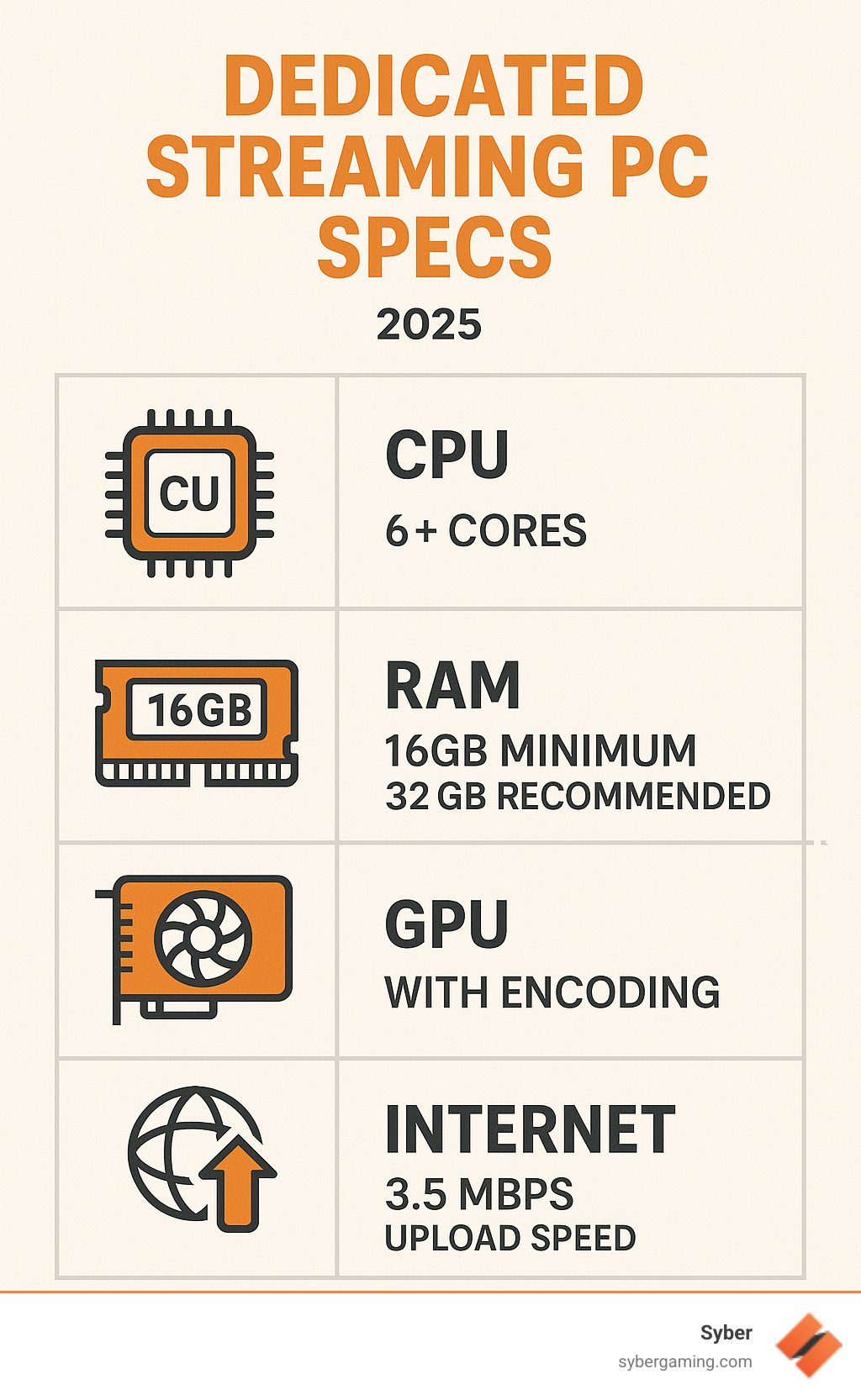
The Blueprint for Your Dedicated Streaming PC Specs
Think of building a streaming PC like assembling your dream team for the ultimate broadcast. Every component needs to work together seamlessly, creating a machine that can handle the demanding world of live streaming while your gaming rig focuses purely on performance. Getting your dedicated streaming pc specs right from the start makes all the difference between amateur hour and professional-quality streams.
CPU and GPU: The Heart of Your Dedicated Streaming PC Specs
Your CPU acts as the director of your streaming operation, coordinating every task and keeping everything running smoothly. For streaming, you'll want at least a six-core processor as your foundation. Modern Intel 12th generation or newer processors excel at handling streaming software efficiently, while AMD Ryzen chips often deliver exceptional encoding performance that won't break your budget.
Here's where things get interesting with AI-improved gaming technology. These powerful processors don't just handle basic tasks anymore. They're smart enough to prioritize streaming processes while managing AI-driven game features that make your content look incredible. The extra processing power means your stream stays stable even when games throw demanding AI-improved visuals your way.
Your GPU choice is equally crucial, and NVIDIA cards have earned their reputation in the streaming world thanks to NVENC hardware encoding. This dedicated encoding chip is like having a specialized employee whose only job is video compression. Intel QuickSync offers similar benefits if you're going the Intel route. A RTX 2060 or better gives you professional-grade encoding capabilities without the premium price tag of flagship cards.
What makes modern GPUs special is their AI-powered graphics processing. These cards don't just render pretty pictures – they intelligently optimize visual quality while maintaining the performance your stream demands. It's technology that works behind the scenes to make your content look polished and professional.
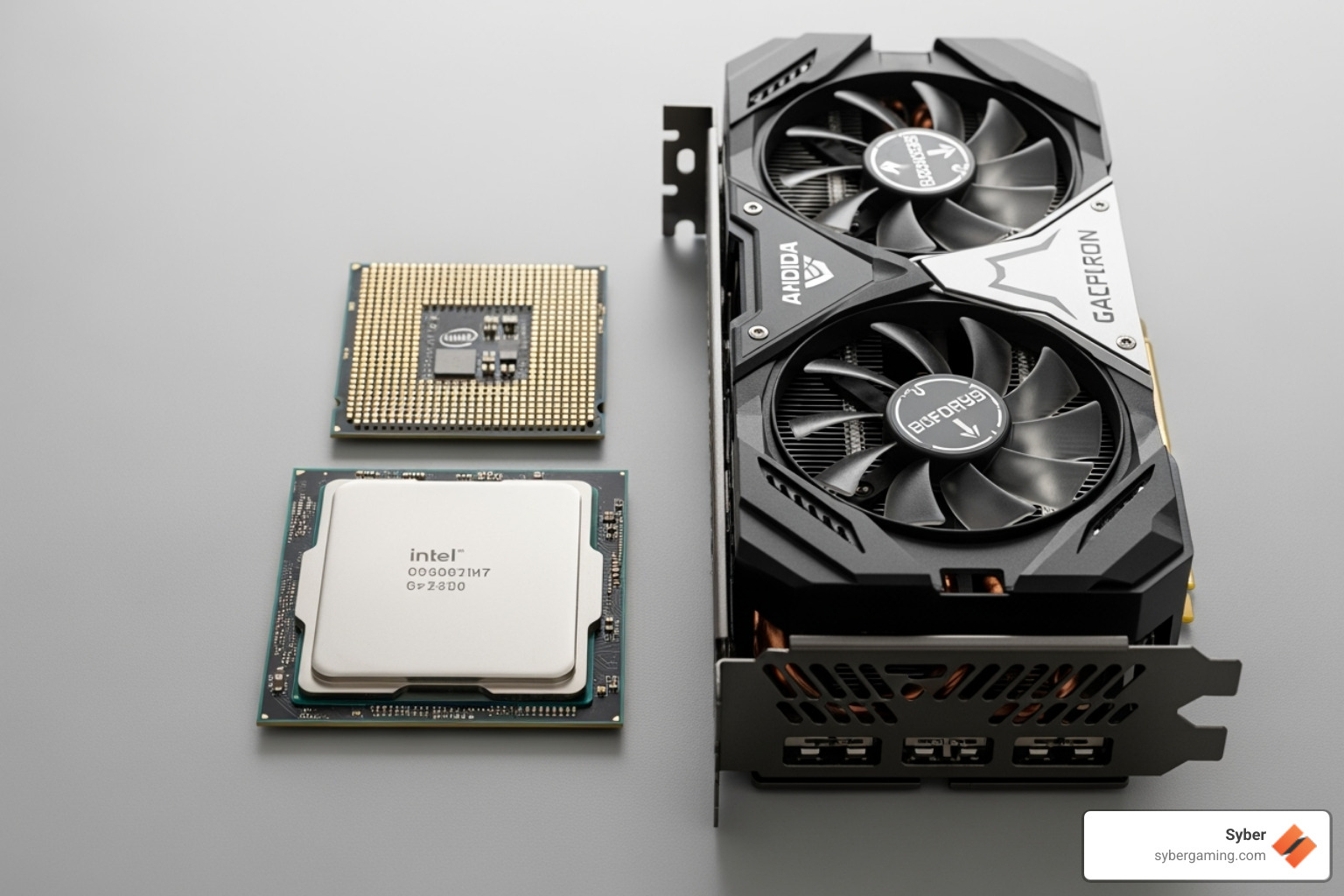
RAM, Storage, and Motherboard Essentials
Memory is where your streaming PC's multitasking happens. 16GB RAM keeps things running smoothly, but 32GB is where you really start to feel the difference. When you're juggling streaming software, chat monitoring, and various background processes, that extra memory becomes your best friend. Aim for 3000MHz speed or higher – your system will thank you with snappier performance across the board.
Storage choices can make or break your streaming experience. An NVMe SSD for your operating system and streaming software means everything loads instantly. No more waiting around for OBS to start up or dealing with sluggish file transfers. Traditional HDDs still have their place for storing recorded streams and archived content, but keep your active applications on that speedy SSD.
Your motherboard ties everything together, and compatibility with your chosen CPU is a must. Look for plenty of PCIe slots for your graphics card and capture cards, plus enough USB ports for all your streaming gear. Modern motherboards designed for AI PC components offer the strong connectivity and power delivery that high-performance systems demand.
The beauty of a well-planned motherboard choice is future-proofing. You'll have room to grow your setup as your streaming career evolves. For guidance on getting the most out of your visual setup, check out our detailed guide on Resolution Rumination: What Resolution to Stream At.
The Encoding Engine: Hardware Encoding for a Flawless Broadcast
Encoding is where the magic happens – changing your raw gameplay into a smooth stream your viewers can enjoy. Hardware encoding using NVENC or QuickSync is your secret weapon here. These specialized chips handle the heavy lifting of video compression without stealing resources from your CPU.
The difference in performance impact between hardware and software encoding is dramatic. While your CPU could theoretically handle encoding, why burden it when dedicated hardware can do the job better and faster? NVENC and QuickSync maintain excellent stream quality while keeping your system resources free for other tasks.
Setting up OBS with hardware encoding is straightforward, and the results speak for themselves. Your internet upload speed becomes the real bottleneck – you'll need 3.5 Mbps for 1080p streaming and 2.5 Mbps for 720p. Always set your bitrate slightly below your maximum upload speed to avoid those frustrating dropped frames that make viewers click away.
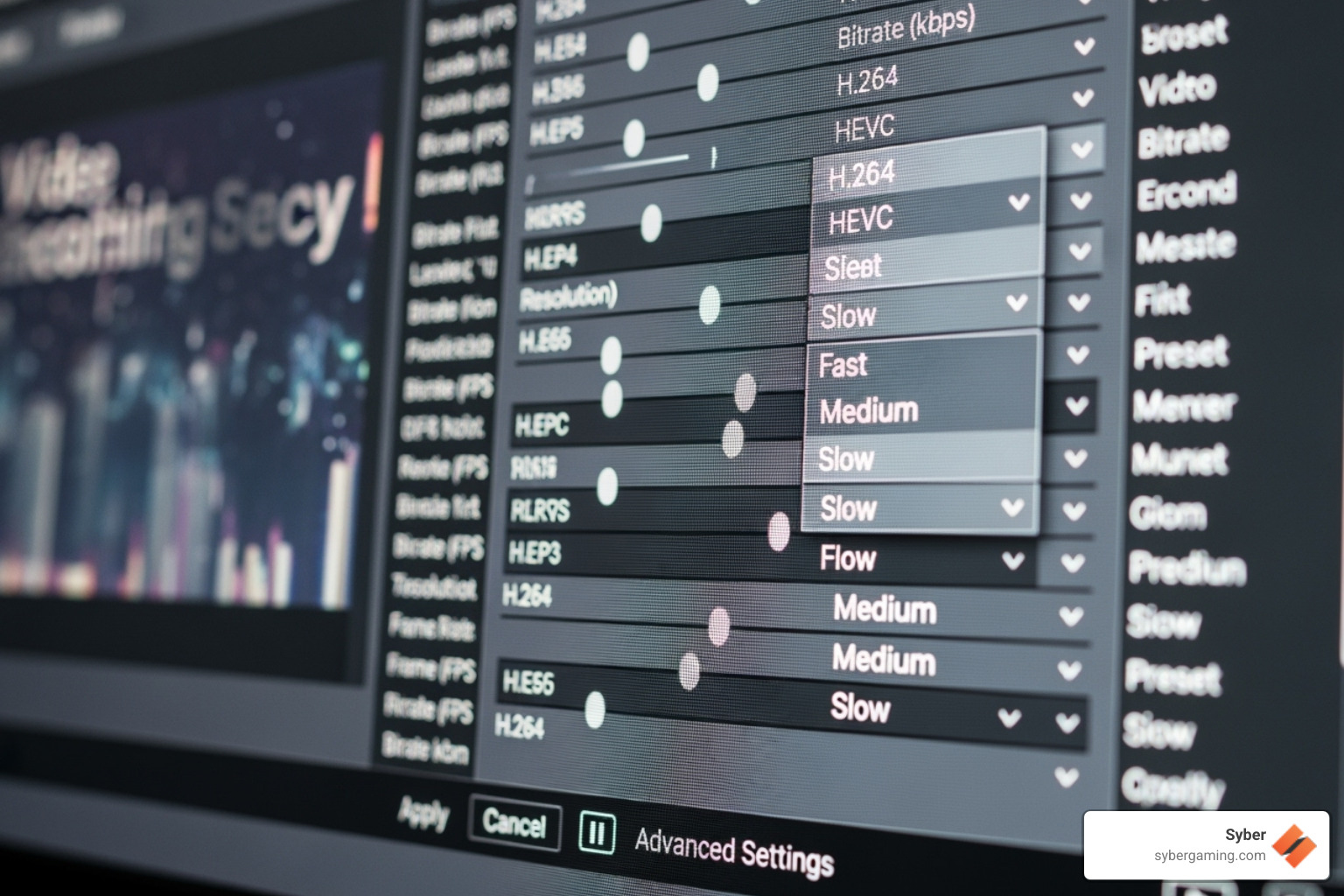
The encoding engine is what separates amateur streams from professional broadcasts. When everything works together properly, your viewers get crystal-clear video while your gaming performance stays rock-solid. For more streaming software insights, explore our comprehensive XSplit: A Multi-Part Guide on Streaming VideoGames.
Power, Cooling, and Finalizing Your Dedicated Streaming PC Specs
Your power supply might not be glamorous, but it's the foundation everything else depends on. A quality PSU with an 80 Plus Gold rating ensures clean, efficient power delivery to every component. Saving money on the power supply is a risk, as a cheap one can fail and damage other parts.
Reliable PSU choices provide consistent power even during demanding streaming sessions. Your components will run more efficiently, last longer, and perform better when they're getting clean, stable power. It's an investment that improves system stability and the lifespan of your parts.
Cooling keeps everything running at peak performance. Good air-flow cooling with properly positioned case fans prevents the thermal throttling that can ruin your stream. Modern AI cooling solutions intelligently adjust fan speeds based on real-time temperatures, keeping your system cool and quiet.
Preventing overheating isn't just about avoiding crashes – heat causes gradual performance degradation that can slowly kill your stream quality over time. A well-ventilated case with organized cables promotes airflow and makes maintenance easier.
Don't forget about your audio setup and microphone quality. The best video in the world won't save a stream with poor audio. Consider how your PC's noise levels might affect your microphone pickup – another reason why quiet, efficient cooling matters.
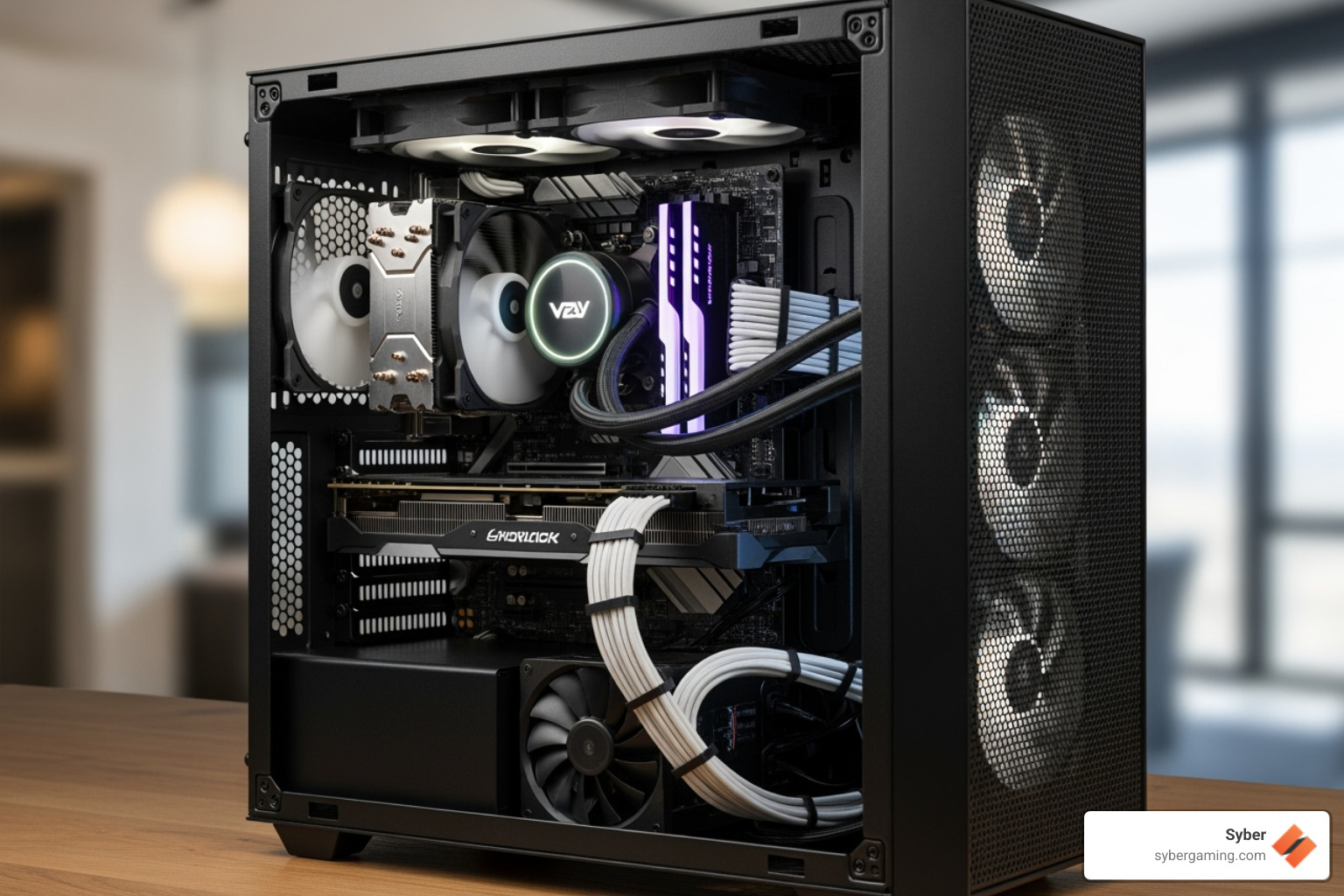
Getting these fundamentals right creates the foundation for a streaming setup that grows with your ambitions. Every component works together to deliver the reliable, high-quality performance that keeps viewers coming back for more.
From Build to Broadcast: Setup, Optimization, and Final Thoughts
Building the perfect dedicated streaming pc specs is like assembling a race car - having all the right parts is just the beginning. The real magic happens when you understand how to make everything work together seamlessly and keep pushing performance to new heights.
The Dual PC Advantage: Why Two is Better Than One
Picture this: you're deep into an intense gaming session, your audience is engaged, and suddenly your single PC starts struggling. Your game stutters, your stream drops frames, and your viewers start leaving. This is exactly why serious streamers swear by dual PC setups.
The beauty of separating your gaming and streaming workloads is simple yet powerful. Your gaming pc high performance rig can focus entirely on delivering smooth gameplay at maximum settings, while your dedicated streaming PC handles all the heavy lifting of encoding, chat management, and stream overlays. No more choosing between great gameplay and professional stream quality.
This separation creates incredible reliability. When your gaming PC needs a quick restart for a driver update or crashes during a particularly demanding game, your streaming PC keeps rolling. You can chat with your audience, explain what's happening, and get back into action without that awkward dead air that kills viewer engagement.
The technical bridge between these systems is a capture card. Think of it as a specialized translator that takes the video and audio from your gaming rig and feeds it into your streaming setup. Internal capture cards are the gold standard here, slotting directly into a PCIe slot on your motherboard. They offer rock-solid reliability and minimal latency compared to USB alternatives.
Modern dual PC setups benefit tremendously from AI-driven performance optimization. Each system can focus on its strengths without interference, creating a streaming experience that feels effortless and professional. Your viewers notice the difference immediately - smooth gameplay footage, crystal-clear audio, and zero technical hiccups.
For those streaming from other gaming devices and looking to leverage PC power, our guide on Streaming PC Console covers the specific setup considerations you may need.
Build vs. Buy and Avoiding Common Pitfalls
Once you've mapped out your ideal dedicated streaming pc specs, you'll face the classic decision: build it yourself or buy pre-built? Both paths can lead to streaming success, but they suit different types of creators.
Building your own streaming PC gives you complete control over every component choice. You can optimize specifically for encoding performance, choose the exact balance of CPU cores and GPU power you need, and potentially save money in the process. The downside? You're on your own for compatibility issues, assembly time, and troubleshooting. There's also no single warranty covering your entire system.
Pre built gaming pc customizable options offer a compelling alternative. You get professional assembly, system-wide warranties, and the confidence that everything works together perfectly out of the box. Syber's high performance custom prebuilt gaming pc systems are a great example of this approach, combining expert component selection with thorough testing to ensure your streaming setup performs well from day one.
Budget considerations play a huge role in your component choices. Budget-friendly builds might feature a Ryzen 3 processor with a GTX 1050, perfect for 720p streaming without breaking the bank. Mid-range configurations step up to Ryzen 5 CPUs paired with GTX 1650 Super graphics, delivering solid 1080p streaming performance with efficient hardware encoding. High-end builds accept Ryzen 7 processors and RTX 2060 Super cards, creating a powerhouse capable of top-tier streaming quality with room to grow.
The most common pitfalls can derail even well-planned builds. Insufficient cooling is a silent killer - components that overheat will throttle performance just when you need it most. Unreliable power supplies might seem like an easy place to save money, but they can destroy your entire investment. Poor internet connectivity will bottleneck even the most powerful hardware, so test your upload speeds and adjust your streaming bitrate accordingly.
Software optimization often gets overlooked, but default OBS settings rarely match your specific hardware perfectly. Experiment with different encoders, resolution settings, and bitrates to find your sweet spot. Even if you're working with an existing PC rather than building new dedicated streaming pc specs, proper software tuning can dramatically improve your results.
At Syber, we understand that streaming is both technical and creative. Our custom build gaming pcs are designed with creators in mind, incorporating the latest AI gaming technology and AI system optimization to ensure your streaming setup can handle whatever you throw at it. Whether you choose our pre built gaming computers or work with us on a fully custom solution, we're committed to helping your content shine.
Ready to transform your streaming setup? Explore our high performance gaming pc build options and find why serious streamers trust Syber for their AI-ready gaming PC needs. Check out our creator community at Content Creation Continues: Syber Squad and see our full lineup at https://www.sybergaming.com/.
Your streaming journey deserves hardware that won't hold you back. With the right dedicated streaming pc specs and a thoughtful setup approach, you'll deliver the professional-quality content that keeps viewers coming back for more.


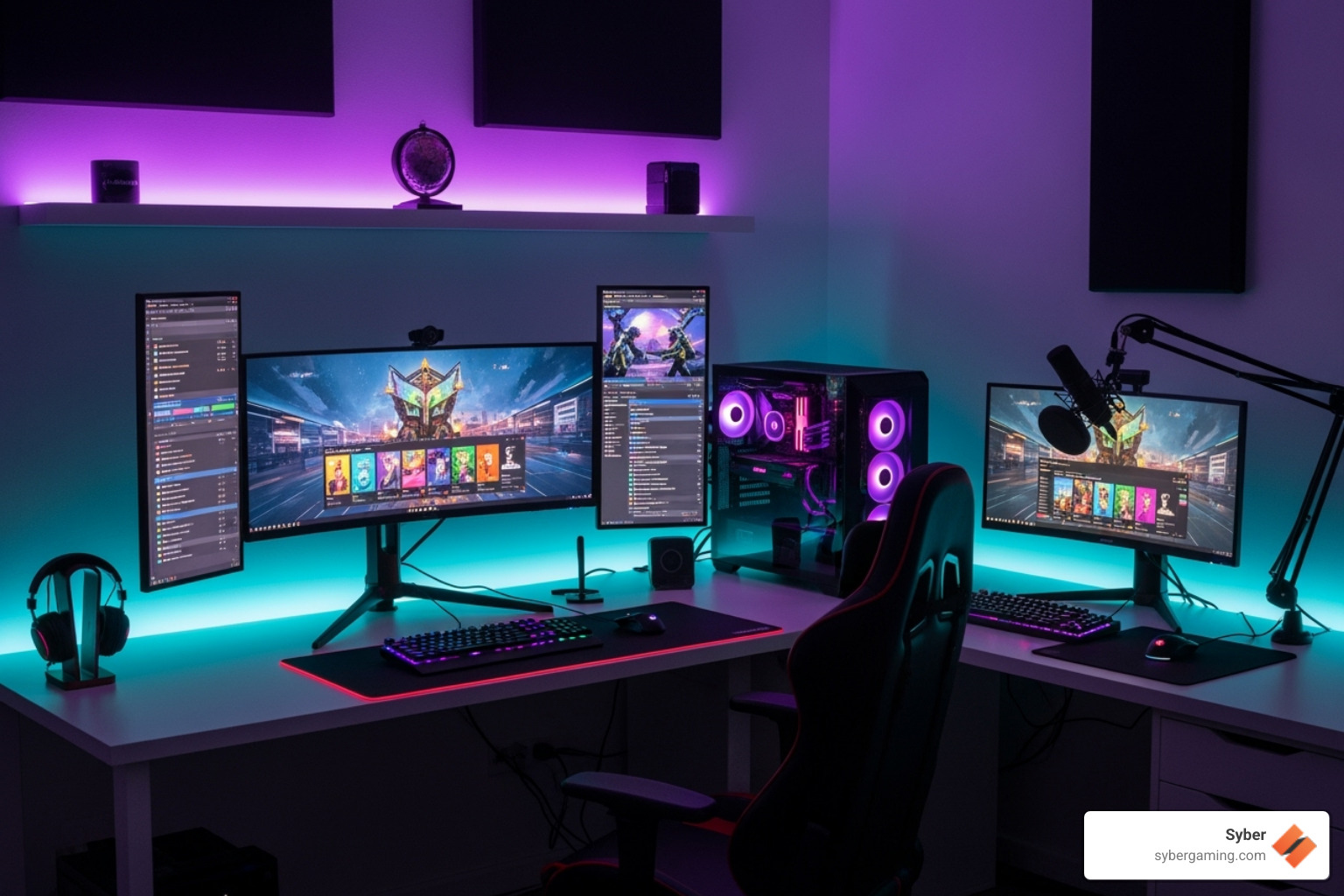

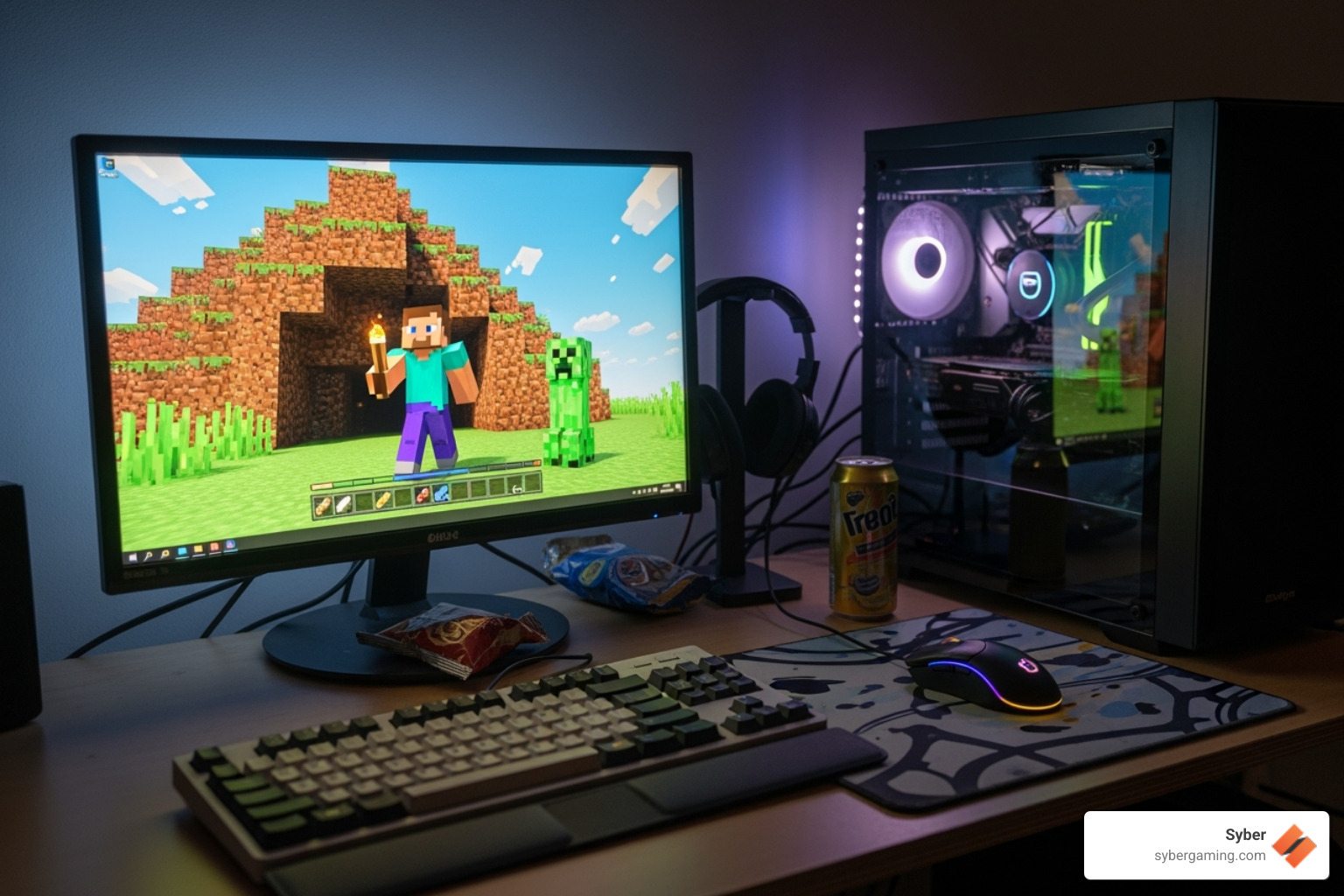

.svg)

